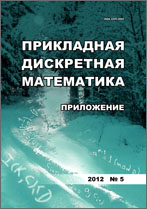|
Computational methods in discrete mathematics
Research of $k$-sieve algorithm for solving the shortest vector problem in a lattice
A. O. Bakharevab
a Novosibirsk State University
b АО «НПК «Криптонит»
Abstract:
Quantum computing has been actively developing in recent decades: the number of qubits operated by a quantum compute is increasing and the probability of computational errors is decreasing. Therefore, there is a need to design and analyze post-quantum cryptosystems — cryptosystems resistant to attacks using a quantum computer. One of the main approaches to designing such cryptosystems is lattice theory. In this approach, the security of most cryptosystems is reduced to solving the problem of finding the shortest vector in the lattice (SVP). The results of the analysis of the $8$-sieve algorithm for solving SVP are presented. We propose a new trade-off between runtime and amount of memory used by the $8$-sieve algorithm. A comparison with known $k$-sieve algorithms is given. The proposed algorithm has the minimum running time on the segment $(2^{0.155n}, 2^{0.189n})$ of memory used among the known $k$-sieve algorithms.
Keywords:
lattice-based cryptography, $k$-sieve, SVP, post-quantum cryptography.
Citation:
A. O. Bakharev, “Research of $k$-sieve algorithm for solving the shortest vector problem in a lattice”, Prikl. Diskr. Mat. Suppl., 2024, no. 17, 157–162
Linking options:
https://www.mathnet.ru/eng/pdma671 https://www.mathnet.ru/eng/pdma/y2024/i17/p157
|

| Statistics & downloads: |
| Abstract page: | 52 | | Full-text PDF : | 29 | | References: | 15 |
|




 Contact us:
Contact us: Terms of Use
Terms of Use
 Registration to the website
Registration to the website Logotypes
Logotypes








 Citation in format
Citation in format 